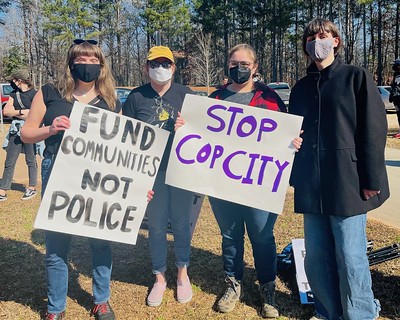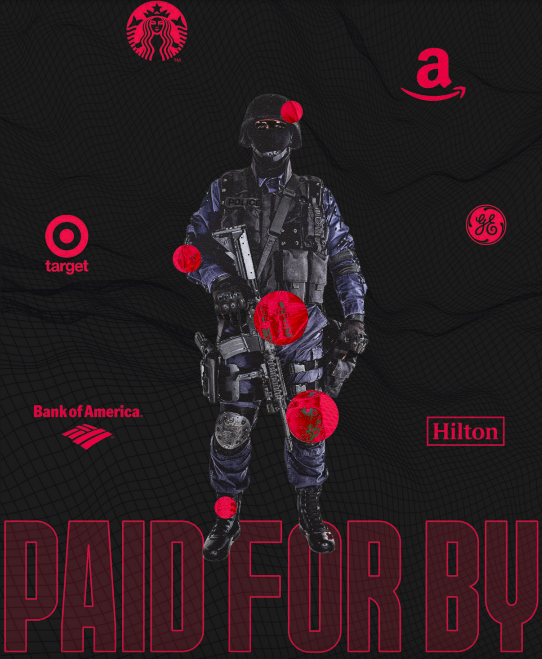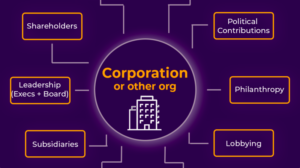4. Philanthropic Relationships

What to look for: Does the corporation have a foundation or philanthropic arm? If so, what think tanks, foundations, or other non-profits are they contributing money to? What think tanks, foundations or other non-profits does the corporation’s leadership donate to? Do any of the corporation’s executives or board members have personal foundations? If so, where are they contributing money?
Where to find it: Guidestar.org, ProPublica Nonprofit Explorer, Inside Philanthropy, news articles, press releases.
Power Research in Action
In 2020, George Floyd was murdered by the police in Minneapolis. In response, people across the U.S. took to the streets to protest systemic racism and police violence. In Philadelphia, power researchers identified which local corporations and universities funded and helped militarize the police by donating money to the police foundation. They called upon these institutions–including University of Pennsylvania, Comcast, and Temple University–to cut ties with the police foundation. Students held protests, activists flooded CEO’s inboxes, and local press reported on how the city’s power brokers propped up the police via the police foundation. In response to pressure from students and city residents, University of Pennsylvania, among others, cut ties with the police foundation.
Police Foundations

Nonprofit research in action: how power researching police foundations identified new corporate targets in the struggle against police brutality and for racial justice
In the summer of 2020, the murders of Breonna Tayler in Louisville, George Floyd in Minneapolis, and Rayshard Brooks in Atlanta, at the hands of police sparked nationwide protests and sent thousands of people into the streets with calls to defund police departments. As these calls gained traction, bloated police budgets came under scrutiny for dominating municipal budgets and siphoning public resources. However, in addition to their public budgets, police departments enjoy the financial and publicity support of nonprofit entities called police foundations.
Police foundations are nonprofit organizations that raise money from individual and corporate donors and then use those funds to sponsor police programs, such as mounted patrol or K-9 units, or buy specific items desired by police departments such as surveillance equipment, weapons, or even, as seen in Atlanta, urban warfare training facilities. Major corporations across virtually every industry are big supporters of police foundations – lavishing them with donations, serving on their boards of directors, and sponsoring their fancy galas, barbeques, and golfing tournaments. In addition to bolstering police budgets, by making these purchases and donating them, police foundations are able to bypass the typical public oversight that is required for municipal-funded police budgets.
If you are researching a police department is it very likely that there is also a police foundation supporting them. Uncovering who is behind these entities and who they are connected to in law enforcement and politics, can reveal why certain decisions are made and help defund campaigns better understand the corporate networks they are up against.
How do we research police foundations?

Between 2020 and 2022 LittleSis released several reports investigating the corporate backers of police foundations. Our 2021 collaboration with Color of Change – Police Foundations: A Corporate Sponsored Threat to Democracy and Black Lives – was the most detailed analysis to-date of the corporate connections to major police foundations across the United States.
Researching police foundations is tricky because unlike publicly traded companies, nonprofits like police foundations have limited disclosure requirements that are required by the IRS in their annual 990s. For instance, they are not required to disclose information about their donors or the affiliations of their board of directors. This means that researchers like us are often left piecing together an understanding of who is running and supporting the foundation with limited information and a lot of internet sleuthing.
Despite this, we compiled important information using just a handful of research tricks and publicly available sources. Anyone can use these same methods to get a better understanding of how the police foundation operates where they live.
- ProPublica Nonprofit Explorer: ProPublic offers an excellent tool that allows a user to review 990s filed by nonprofits and easily compare them to previous years.
- Websites: Police foundations are typically not shy about their achievements, parties, and purchases for the police. They want to bring in more donations after all. Simply scouring a website can reveal more information about their operations than their 990. Be sure to look for information about the board of directors and the corporations they represent, events with listed sponsors, and program pages that may outline how the donations are spent.
- Social Media: Police foundations are often active on social media sites like Facebook, Instagram, and Twitter. You might find details about events and donors by reviewing their activity on these sites.
- The Wayback Machine: Still can’t find what you’re looking for? You can review older iterations of websites using archive.org’s Wayback Machine to see if information was removed from the website.
Ready to try it out? Check out our training “How to research police foundations (and other nonprofits)” on our YouTube channel for details on how to use each of these techniques to compile information on police foundations and better understand how they operate.








